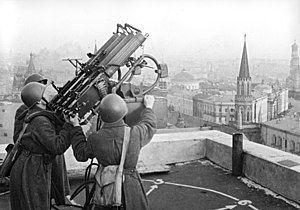Mozhaisk Defence Line
| Battle of Moscow | |||||||
|---|---|---|---|---|---|---|---|
| Part of the Eastern Front of World War II | |||||||
 Soviet anti-aircraft gunners on the roof of the Moskva hotel. |
|||||||
|
|||||||
| Belligerents | |||||||
|
|
|
||||||
| Commanders and leaders | |||||||
|
Walther von Brauchitsch / Adolf Hitler Fedor von Bock Albert Kesselring |
Joseph Stalin Georgy Zhukov Aleksandr Vasilevsky |
||||||
| Units involved | |||||||
| Strength | |||||||
|
As of 1 October 1941: 1,183,693–1,929,406 men, 1,000–2,470 tanks and assault guns, 14,000 guns, Initial aircraft: 549 serviceable At time of counter offensive: 599 |
As of 1 October 1941: 1,250,000–1,400,000 men, 3,232 tanks, 7,600 guns, Initial aircraft: 936 (545 serviceable) At time of counter offensive: 1,376 |
||||||
| Casualties and losses | |||||||
| 174,194(see §7) | 1,029,234(see §7) | ||||||
Strategic Soviet victory
The Battle of Moscow (Russian: Битва за Москву, translit. Bitva za Moskvu) was a military campaign that consisted of two periods of strategically significant fighting on a 600 km (370 mi) sector of the Eastern Front during World War II. It took place between October 1941 and January 1942. The Soviet defensive effort frustrated Hitler's attack on Moscow, the capital of the Union of Soviet Socialist Republics (USSR) and the Soviet Union's largest city. Moscow was one of the primary military and political objectives for Axis forces in their invasion of the Soviet Union.
The German strategic offensive, named Operation Typhoon (German: Unternehmen Taifun), called for two pincer offensives, one to the north of Moscow against the Kalinin Front by the 3rd and 4th Panzer Armies, simultaneously severing the Moscow–Leningrad railway, and another to the south of Moscow Oblast against the Western Front south of Tula, by the 2nd Panzer Army, while the 4th Army advanced directly towards Moscow from the west. According to Andrew Roberts, Hitler's offensive towards the Soviet capital was nothing less than an 'all-out attack': "It is no exaggeration to state that the outcome of the Second World War hung in the balance during this massive attack".
...
Wikipedia
